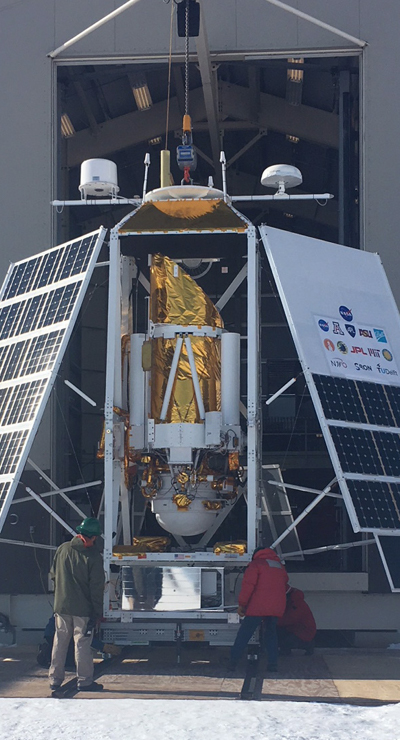Ever-evolving research creates a constant need to advance the design and manufacturing opportunities supporting the collaborative efforts of research on a global scale. The Instrument Design and Fabrication Machine Shop, an ISO 9001:2015 & AS9100D certified facility, provides solutions in our effort to fulfill these research opportunities. Our highly specialized staff bring a combined 309 years of experience to provide excellent level of consulting, mechanical design, machining and prototyping services for specialized research projects.
Located within the Research Support Services building on Arizona State University’s Tempe campus, the machine shop provides consulting, design, prototyping, repair services. Our Machine Shop staff work collaboratively with colleagues in electronic and glassblowing service groups across the Instrument Design and Fabrication core to provide cross-functional solutions allowing users complete project support.
Our group supports ASU internal researchers, peer institutions and external private industry research for instrument design, manufacturing, maintenance, repair and specialized project development. Our full-service Machine Shop performs a wide range of projects from component customization and modification to mechanical design, prototyping and fabrication services. Specialties include the production and support of quality prototypes and instrumentation for ASU scientists and researchers as well as for non-ASU customers utilizing a wide variety of equipment to fabricate your custom project.
Acknowledgement:
This research was supported in part by The Instrument Design and Fabrication Core Facilities at Arizona State University.
Hours: Monday - Friday: 7 a.m. to 4 p.m.
Location: Research Support Services Building, Room 101
Contact: idfcore@asu.edu | 480-965-3300
LinkedIn: Core Research Facilities LinkedIn Page
Testimonials

“They’re not afraid to do anything. A lot of commercial shops will just say ‘no’ if it’s anything difficult or weird.”
For Christopher Groppi, engineer and associate professor in ASU’s School of Earth and Space Exploration, the sky is not the limit, but rather just the beginning when working with IDF machine shop. Groppi considers IDF essential to his research for their adaptability, understanding of science and ability to work on quick turnarounds. Among the projects that IDF has helped him to build is the complex interior of an Antarctic-bound scientific balloon that he designed.
The size of a football stadium and flying 125,000 feet above the ground, the instrumentation on board the balloon collects data that Groppi analyzes to learn how new starts and planets form. This massive balloon’s belly was machined to detect terahertz light at very cool temperatures, requiring complex parts made of high-purity oxygen-free copper. IDF not only sourced a 200-pound block of copper but in one attempt created the elaborate interior from the copper block.
“Everything we do is the first time anyone has tried it, so usually we’re not sure if it’s going to work. The IDF staff is very good at talking with us so that we can come up with an optimal design that’s easy, economical and possible to fabricate while still accomplishing the goals we want. My research would not be possible without a campus machine shop.”
Chris Groppi
Associate Professor
School of Earth and Space Exploration
(Internal ASU user)
To visit the Instrument Design and Fabrication shop, Dr. Phil Christensen takes a short, terrestrial stroll downstairs from his office. But the instruments he has designed and built with IDF have traveled millions of cosmic miles, collecting invaluable data on our solar system.
Christensen, a Regents’ Professor in ASU’s School of Earth and Space Exploration, has worked with IDF to design and give life to several space explorers, including the OSIRIS-REx Thermal Emission Spectrometer, or OTES.
OTES is heading to Bennu, a primitive near-Earth asteroid that may hold secrets about the formation of our solar system and our own planet. OTES will map the surface of Bennu and collect a sample from the surface for ASU scientists to analyze.
OTES is the youngest of Christensen’s instruments. Others that he has created with IDF have been orbiting Mars for twenty years now, with the creators’ signatures proudly soaring through space on an aluminum plaque.
“It is essential for a research university to have a facility like IDF. What we do at a university is we invent things, we make one-of-a-kind things, and IDF is incredibly valuable for helping us make these one-of-a-kind inventions,” says Christensen.
IDF not only works with professors, but also nurtures the next generation of researchers and explorers. Christensen has been working with IDF to give undergraduates the experience of designing and building their own instruments alongside expert engineers and machinists.
“You just have to have someone who’s willing to sit down with a graduate student who probably has never designed or built anything themselves. You don’t want that to be an impediment, you want to encourage students to be creative. You need someone like the folks at the IDF who can say, ‘Here, let me help you. Together, we’ll design this thing, and then we’ll make it for you and we’ll teach you how to make it.’”
Phil Christensen
Regents’ Professor
School of Earth and Space Exploration
(Internal ASU user)

